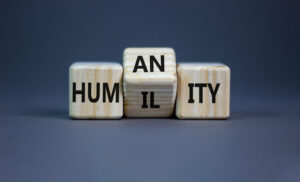
And why the effort is worth it.
August 8, 2021
Humility can be a slippery concept.
When clients describe themselves as humble, my first thought is often, hmmm, I wonder, is that true?
When we’re sure we’ve arrived at humility, we need to be careful that what we’re experiencing isn’t arrogance. Arrogance is a sense of pride that makes us feel like we’re better than others. The opposite of humility, right
What Is Humility?
Humility is a modest view of one’s importance.
It is not, however, a negative view of oneself. It is not reflective of positioning ourselves as doormats. Nor is it about meeting others’ needs at the expense of our own.
Humility is a realistic assessment of our place in the universe. We are one individual among almost eight billion people who inhabit this planet. Seen in that perspective, we are a grain of sand in an immense sandbox. But while we’re here, we matter to ourselves and those we touch and with whom we share space more than we know.
We gravitate toward humble people because they share some appealing characteristics. They tend to be grateful for what they have. They understand that others may have information they don’t have. They know that having the last word is not essential. And they’ve figured out that giving other people credit for how they got as far as they got is reasonable and appropriate.
But humility can’t be forced or faked.
It comes with time and experience, both of which show us the truth of our strengths and limitations.
To show up with humility, we need to be present, open, willing to take ourselves lightly, and when appropriate, put others before ourselves. Until we have had enough breadth and depth of life experiences to understand the reality of our situation, it is natural to struggle between arrogance and humility. It’s part of the process.
How to Cultivate Humility
Allow time and life experience to help it along.
Time has taken some of the starch out of my sense of self, softening and relaxing my know-it-all tendencies — making it clear that I never know as much as I think I do. Or, more gently, that there is more to be learned about everything than I know or understand.
In my counseling master’s program, I remember having strong views about this or that theoretical framework or approach. I’m embarrassed when I think back to some of the simplistic and ragingly uninformed opinions and comments I shared in class.
Know when to ask for help.
As a new psychotherapist, I couldn’t think of anyone I would refer my clients to because no one would do it the way I did it. I look back at that younger self, so full of confidence, utterly unaware of how little she knew, and I feel some degree of tenderness toward her hubris. Today I refer to many therapists who teach me more about what I don’t know.
Look for new ideas and approaches, vs. searching for information to support what you already think you know.
I continue to collect articles and books from people who have a depth of understanding about the human condition that I won’t achieve in this lifetime. That used to make me feel uncomfortable and sort of compulsive about learning everything as quickly as possible. These days the thought of learning everything makes me feel tired. It’s enough that I have access to great minds — I don’t have to have one.
Be grateful for what you have.
Humility is about getting out of our own way. When we’re striving to be more impressive, in whatever way we attempt to do that, we make it almost impossible to appreciate the gifts we have.
At the end of each day, do a quick inventory of all the ways someone, somewhere, helped you to get through the day. Ask yourself what you offered, how you helped someone else do the same?
When I remember to get out of my own way, I react more slowly, thoughtfully, and purposefully. I listen better, with genuine curiosity. And for me, nothing reduces stress better than remembering I inhabit a world of fascinating people who know more than I do.
I don’t always remember where I am in the pecking order of the universe, but when I do, life is easier.
Experiment with taking your opinions and ideas about everything a little less seriously. See if life doesn’t get more interesting, and maybe, more peaceful.
I’d love to hear your thoughts on these ideas.
Much love,
